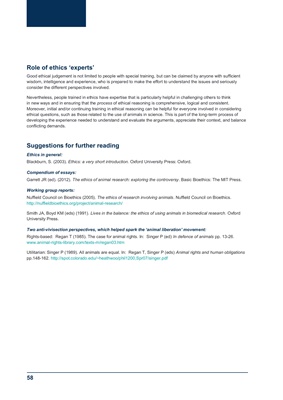
58
Role of ethics "experts"
Good ethical judgement is not limited to people with special training, but can be claimed by anyone with sufficient
wisdom, intelligence and experience, who is prepared to make the effort to understand the issues and seriously
consider the different perspectives involved.
Nevertheless, people trained in ethics have expertise that is particularly helpful in challenging others to think
in new ways and in ensuring that the process of ethical reasoning is comprehensive, logical and consistent.
Moreover, initial and/or continuing training in ethical reasoning can be helpful for everyone involved in considering
ethical questions, such as those related to the use of animals in science. This is part of the long-term process of
developing the experience needed to understand and evaluate the arguments, appreciate their context, and balance
conflicting demands.
Suggestions for further reading
Ethics in general:
Blackburn, S. (2003). Ethics: a very short introduction. Oxford University Press: Oxford.
Compendium of essays:
Garrett JR (ed). (2012). The ethics of animal research: exploring the controversy. Basic Bioethics: The MIT Press.
Working group reports:
Nuffield Council on Bioethics (2005). The ethics of research involving animals. Nuffield Council on Bioethics.
http://tinyurl.com/nuffield-report
Smith JA, Boyd KM (eds) (1991). Lives in the balance: the ethics of using animals in biomedical research. Oxford
University Press.
Two anti-vivisection perspectives, which helped spark the 'animal liberation' movement:
Rights-based: Regan T (1985). The case for animal rights. In: Singer P (ed) In defence of animals pp. 13-26.
www.animal-rights-library.com/texts-m/regan03.htm
Utilitarian: Singer P (1989). All animals are equal. In: Regan T, Singer P (eds) Animal rights and human obligations
pp.148-162. http://spot.colorado.edu/~heathwoo/phil1200,Spr07/singer.pdf